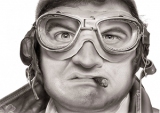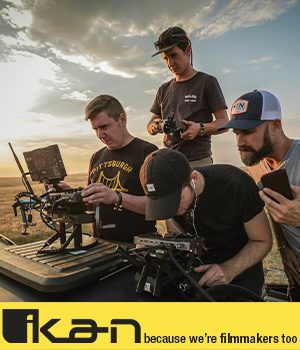- Forum
- General Discussion | Introductions | Off Topic Forum
- Photography General Discussion
- Would you convert your camera to monochrome?
Would you convert your camera to monochrome?
-
 Topic Author
Topic Author
- NickSano
- Photography Hooked
-
- Nikon D800
- Followers: 130
- Posts: 612
-
Points:
4907
Post #382918
This would be a big commitment, but I would like to know how is this conversion different from what can be achieved from Photoshop?
Post #382919
-
 Topic Author
Topic Author
- NickSano
- Photography Hooked
-
- Nikon D800
- Followers: 130
- Posts: 612
-
Points:
4907
Post #382932
-

- Hassner
- Super User
-
- Canon 40D 50D 60D 5DII Canon SX60HS
- Followers: 1405
- Posts: 22166
-
Points:
113147
Post #382944
For landscapes we used mostly orange and red. It would darken blue sky and make the clouds stand out.
Green would wake the plants lighter and give a weird semi ultraviolet feel.
For portraits we used yellow or even orange to lighten the skin.
Your single colour digital image can be processed to b&w in many colour filter options.
In Photoshop, go to Image > Adjustments > Channel Mixer.
A new window will open up. Click on the block in the bottom left that says Monochrome.
Your photo will change to b&w. You will see the red 40%, green 40% blue 20% channels.
Play with those combinations so that the total % will always be 100%, eg red 80%, green 20%, blue 0%
Try it and tell us if it swayed you from limping your camera.
 Top Poster
Top Poster Lounge Guru
Lounge Guru-

- Stealthy Ninja
- Moderator
-
- Fuji X stuff and a 1DsIII for some reason
- Followers: 982
- Posts: 16300
-
Points:
6837
Post #382967
There's people out there who will pay a LOT more for a monochrome only camera because it gives more tonal value? dynamic range? not sure what it does, but people want the best of the best in black and white, then they'll pay.
People convert their cameras to infrared, that's exactly why I bought my 1DsIII, my friend was going to do an IR conversation, I had to save it. I understand a monochromatic conversation a lot more.
-

- Allen D
- Snapobsessed
-
- Nikon D500 and Panasonic GH5
- Followers: 54
- Posts: 274
-
Points:
1155
-

- gdbrekke
- Vendor
-
- Canon 1D Mark IV (x2), 6D
- Followers: 7
- Posts: 16
-
Points:
10
Post #383097
Shoot RAW and then use Lightroom, Photoshop or Aperture to convert to B&W/Monochrome.
In Lightroom (and maybe Aperture too) you retain all the color data when you convert to B&W and are still able to adjust individual colors - along with most other adjustments like contrast, shadow, highlights, etc. - as if you were using filters to shoot monochrome.
Cheers,
Gregg
-

- Superman
- Photography Hooked
-
- Nikon D810 and Z6
- Followers: 118
- Posts: 688
-
Points:
2393
-

- Stealthy Ninja
- Moderator
-
- Fuji X stuff and a 1DsIII for some reason
- Followers: 982
- Posts: 16300
-
Points:
6837
Post #383215
gdbrekke wrote: What Joves and Hassner said...
Shoot RAW and then use Lightroom, Photoshop or Aperture to convert to B&W/Monochrome.
In Lightroom (and maybe Aperture too) you retain all the color data when you convert to B&W and are still able to adjust individual colors - along with most other adjustments like contrast, shadow, highlights, etc. - as if you were using filters to shoot monochrome.
Cheers,
Gregg
Sure, but what if they could do the following:
Make every pixel measure true luminance values and not used to extrapolate tones or hues, therefore making the full potential of the sensor better exploited, resulting in sharper images.
???????????????????? WELL ?????????????????????????
-
 Topic Author
Topic Author
- NickSano
- Photography Hooked
-
- Nikon D800
- Followers: 130
- Posts: 612
-
Points:
4907
-

- Howard T
- Lone Wolf
- Followers: 66
- Posts: 168
-
Points:
1096
Post #383369
But seriously, when I've done B&W digital I found comparing some of my own film and darkroom and digital that the Photoshop conversion made portions of the image darker or lighter than in the original. So I haven't been using the conversion setting in Photoshop, I remove color - which is really what B&W is, the absence of color. That's what I found works for me. I'm usually thinking about B&W before I start shooting, thinking about the tones, if I see nice contrast of dark and light in the scene, etc.
Sharon
Post #383370
Stealthy Ninja wrote:
gdbrekke wrote: What Joves and Hassner said...
Shoot RAW and then use Lightroom, Photoshop or Aperture to convert to B&W/Monochrome.
In Lightroom (and maybe Aperture too) you retain all the color data when you convert to B&W and are still able to adjust individual colors - along with most other adjustments like contrast, shadow, highlights, etc. - as if you were using filters to shoot monochrome.
Cheers,
Gregg
Sure, but what if they could do the following:
Make every pixel measure true luminance values and not used to extrapolate tones or hues, therefore making the full potential of the sensor better exploited, resulting in sharper images.
???????????????????? WELL ?????????????????????????
Yeah but reading their page they are not doing that unless they are rewriting the algorithms for the processing. They are merely messing with the filters. In this case they are converting the D800 into an E version with their HR filter, getting rid of the AA filter. So by just messing with the filtration only you are not really increasing any of the cameras ability to measure true luminance. With the D800 you are better of getting the HR filter than a B&W conversion. The Leica you showed is specifically made that way. In this case you can do just as good with your processing software, so why bother with a stupid conversion that limits your camera. Well unless you have money to burn so you have a camera to shoot color as well, or better yet buy the Leica.
-

- Sawyer
- Master of the Lens
-
- Canon 5D Mark II
- Followers: 248
- Posts: 1854
-
Points:
13106
Post #383390
Canon 5D Mark II | Canon 70-200mm f/2.8L IS USM | Canon 35L | Sigma 85 1.4 | Helios 44M-6 58mm(M42) | Zeiss 50mm 1.4 (C/Y) | Canon 135L | (2) 430EX II
- Forum
- General Discussion | Introductions | Off Topic Forum
- Photography General Discussion
- Would you convert your camera to monochrome?
Latest Reviews
The Canon EOS R100 is an entry-level mirrorless camera introduced in 2023. But just because it’s an entry-level camera doesn’t mean it’s a bare-bones camera. Find out why in this review!
Nikon’s retro-looking Nikon Zfc is anything but retro. Under its classic body is a host of features and amenities that make it a worthwhile compact mirrorless camera for 2024.
The Canon EOS R50 is one of the newest R-system cameras from Canon. Is it worth your money? Find out all the details you need to know in this comprehensive review.
The Sony FE 70-200mm f/2.8 GM OSS II is Sony’s flagship mirrorless zoom lens. As such, it’s loaded with features and has a top-shelf build quality that makes it a top pick!
Forum Top Posters
-
1TCav 6 posts
-
2Razky 5 posts
-
3Prago 4 posts
-
4CharleyL 4 posts
-
5Randy Shaw 4 posts
-
6Sandy Smith Photos 3 posts
-
7CaptNemo 3 posts
-
8Hassner 3 posts
-
9db3348 3 posts
-
10Foggy 3 posts
Latest Articles
The Canon EOS R100 is an entry-level mirrorless camera introduced in 2023. But just because it’s an entry-level camera doesn’t mean it’s a bare-bones camera. Find out why in this review!
Are you ready to upgrade your camera? Before buying new, you might consider the value of purchasing used gear to save money.
The Olympus OM-D E-M10 Mark IV is a micro four thirds camera released in 2020. It’s an entry-level system along with the OM-D E-M5 Mark III. Use this guide to determine which one is best for you!
Blue hour photography might not be as well known as golden hour photography, but it is every bit as good a time to create epic images of landscapes. Learn how in this quick tutorial!
Nikon’s retro-looking Nikon Zfc is anything but retro. Under its classic body is a host of features and amenities that make it a worthwhile compact mirrorless camera for 2024.
Moving from taking snapshots of your dog to creating beautiful images doesn’t have to be that difficult! Use the tips outlined in this dog photography guide, and you’ll get better results in no time.
Acrylic print photos are a beautiful way to display your favorite images. But they don’t come without some questions. Get all the answers you need about this medium in this guide!
Where do you get your landscape photography inspiration? Is it from masters like Ansel Adams? Or perhaps viewing art from other genres? We’ve got these and a few other sources for you to check out!




















